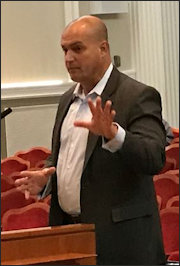
SolUnesco CEO Francis Hodsoll addresses the Albemarle County Board of Supervisors. Photo credit: Charlottesville Tomorrow.
Not all barriers to solar energy emanate from Richmond. Take Albemarle County, for example. The county zoning code outlaws solar farms, we learn from Charlottesville Tomorrow.
“The current zoning ordinance allows for the transmission and distribution of energy, but not the generation of energy,” said county planner Margaret Maliszewski at Wednesday’s Board of Supervisors meeting.
The issue arose because Reston-based SolUnesco wants to submit an application to develop an 11-megawatt photovoltaic solar energy generation system in southern Albemarle. “Our project is for the wholesale supply of energy that goes onto a wholesale network of transmission and distribution lines and that allows people to buy energy from our project or for a utility to buy energy directly from us,” said SolUnesco CEO Francis Hodsoll.
Albemarle Supervisors directed the planning department to study the issue. But, while the Charlottesville-Albemarle area may be home to many solar-loving greenies, don’t take it for granted that county planners will roll over for SolUnesco.
“As a member of a rural neighborhood, the first thing that comes to mind is protection of the rural areas,” said Phillip Fassieux at the board meeting. “We all love solar power, but at what cost? … “How will residents of Albemarle benefit specifically from turning over part of our rural county to its use? Will we see reductions in electricity rates?”
Everyone loves solar in theory, but opposition frequently surfaces locally when someone proposes building a solar farm near them. Others object to the idea of vast solar farms displacing agricultural uses of the land. SolUnesco’s proposed 11-megawatt solar farm, big enough to supply demand for about 2,000 households, would require between 70 and 80 acres of land. Typically, solar farms include vegetated buffer zones to screen the solar panels from view.
(Another potential objection to solar is that, given the state formula for distributing school aid, a big capital investment in solar could actually hurt a county financially. I’ll deal with that issue in a separate post.)
Bacon’s bottom line: Call me a Neanderthal, but I support private property rights. I see no justification for Albemarle County — or any county — to impose zoning restrictions prohibiting solar farms. If a property owner decides that installing solar panels represents a use of land preferable to agriculture or timber, that should be his decision to make. Counties have no business intervening unless the land use creates a nuisance to neighbors. Unlike wind turbines, solar panels create no noise, are easily hidden from view, and don’t harm wildlife. NIMBYs need to get a life.
And one more thing… The SolUnesco pitch to landowners asserts that its 25-year leases will generate above-market returns for landowners with an inflation escalator. The company assumes all costs and risks associated with developing the project — the landowner just collects checks for 25 years.
Rural Virginia is hurting. It has few resources of value in the knowledge economy. One thing it does have is land. Solar energy represents a rare opportunity for Virginia’s rural economy. There are many complex issues surrounding the integration of solar into the electric grid that need to be resolved before we see widespread deployment, but land use should not be one of them.


